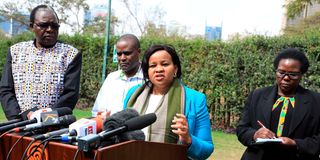Cherera, three other 'dissenting' IEBC officials to face MPs over ouster bid

From left; IEBC commissioners Justus Nyang'aya, Francis Wanderi, Vice chairperson Juliana Cherera and Irene Masit address the media on August 16, 2022 at the Serena Hotel where they said that presidential results announced by chairperson Wafula Chebukati were not credible.
Juliana Cherera and three other IEBC officials who disowned August presidential polls results will face MPS on Thursday over petition seeking their ouster.
The petitions want the removal of Independent Electoral and Boundaries Commission (IEBC) vice chair Cherera, commissioners Francis Wanderi, Justus Nyang’aya, and Irene Masit.
The petitions are by Republican Party, Rev Dennis Ndwiga Nthumbi, Geoffrey Lang’at, and Steve Gerry Owuor.
Now, MPs in the Justice and Legal Affairs Committee will grill the four petitioners.
Present a report
They will know their fate when the parliamentary committee presents a report on whether President William Ruto should form a tribunal to probe their case or not.
Upon tabling of the report by the committee, the House will have 10 days to decide whether the petition has valid grounds for the removal of one or all of the commissioners.
Article 251 of the Constitution provides that commissioners can only be removed through a petition filed in the National Assembly and a tribunal formed by the President.
The chairperson and the commissioners, who are constitutional office holders, can be removed only for serious violation of the Constitution or any other law, including a contravention of Chapter Six, gross misconduct, whether in the performance of the member’s or office holder’s functions or otherwise.
Other grounds include physical or mental incapacity to perform the functions of office, incompetence or bankruptcy.
“The tribunal shall investigate the matter expeditiously, report on the facts and make a binding recommendation to the President, who shall act within 30 days,” reads Article 251 (6).
In its petition, the Republican Party accuse the four commissioners of violating the Constitution by rejecting the results.
It argues that the commissioners failed to meet the integrity test of the office they hold, and brought dishonour and indignity to the nation contrary to Article 71 of the Constitution.
The petitioner also says the officials acted in a manner that demean the office they hold contrary to Article 75 of the Constitution.
Rev Nthumbi in his petition accuse the commissioners of serious violation of the law, gross misconduct and incompetence.
Rev Nthumbi said the four commissioners demonstrated partiality and biased conduct in agreeing in a proposal to alter the results in favour of one candidate or to force a runoff, both actions he said were against the Constitution and set laws.
Rev Nthumbi also argues that the commissioners had erred in law by “acting in liaison with one faction in a presidential election” and that they had given in to proposals by the National Security Advisory Council (NSAC) to review the results, which they said was against the law.
Mr Lang’at and Mr Owuor make the same allegations against the four commissioners, citing their rejection of the presidential results, a move they said threatened the cohesion of the country, as well as the independence of the commission.
The four petitioners want the House to find the four commissioners culpable and transmit a finding for the President to form a tribunal to look into the conduct of the four poll officials.
“The work of the committee is to guide the House by way of a comprehensive report on whether the petitions satisfies the conditions set for the removal of one or all of the cited members of an independent commission,” said National Assembly Speaker Moses Wetang’ula when he read out the petitions to the House last week.
Mr Wetang’ula directed the committee to accord the commissioners right to appear in person or represented by a lawyer, as well as the right to cross examine the petitioners under oath over all matters related to the petition.
He warned the committee against prosecuting the petition on behalf of the petitioners but allow each of them to present their case saying that the committee should not be an avenue for prosecuting the interest of wither the commissioners or the petitioners.





